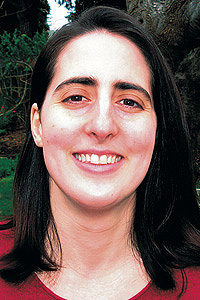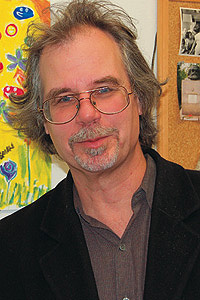Growth in outreach programming leads to gains in leadership for Humanities’ Civic Knowledge Project
By Josh SchonwaldNews Office
 Joanie Friedman  Bart Schultz | |
After three years of continued growth, the University’s Civic Knowledge Project, which was started to enhance the University’s relationship with the surrounding neighborhoods, recently announced two new hires.
Bart Schultz, Senior Lecturer in the Humanities and Special Coordinator for the Graham School of General Studies, has been named Director of the Civic Knowledge Project. Joanie Friedman, formerly of the Redmoon Theater, has joined the project as Program Coordinator to focus specifically on managing its growing Southside Arts and Humanities Network.
The directorship, formerly held by Elizabeth Babcock, has grown into these two collaborative positions. “This is a testament to the growth and popularity of the programs,” said David Thompson, Associate Dean of Planning and Programming in the Division of the Humanities. The Civic Knowledge Project also has grown with generous support from the Chicago Community Trust, the Spencer Foundation and private donations.
Schultz, a political philosopher and author of the award-winning book, Henry Sidgwick: Eye of the Universe, has taught classes in the College for more than two decades. In addition to his scholarship and teaching, he has been developing service-learning opportunities for undergraduate and graduate students, and designing humanities programs for a general audience.
Since 2002, Schultz has been planning ethics-related programming for a general audience for the Graham School. In 2005, he became the liaison between the Civic Knowledge Project and the Graham School, and developed courses open to both University and community members, a number of which have been held at the DuSable Museum of African American History.
“Under Bart Schultz’s leadership I’m confident the CKP will continue to grow and to redefine and enhance the University’s relationship to its South Side community, allowing for the exchange of knowledge—in both directions—across university boundaries,”said Rebecca Zorach, member of the Civic Knowledge Project Faculty Advisory Committee and Assistant Professor in Art History and the College.
In his new role, he will be chiefly responsible for fulfilling the core mission of the project. “His specific mandate,” wrote Danielle Allen, Dean of the Division of the Humanities and founder and former Executive Director of the Civic Knowledge Project, “is to continue to develop humanities programs that allow for the exchange of knowledge and enriched intellectual engagement between University and community and community and University.”
Said Schultz of his new role, “I’m delighted. It’s a tremendous opportunity to enrich the intellectual connections between the University and the South Side community.”
Schultz will assume responsibility for several Civic Knowledge Project initiatives that have grown in popularity in recent years with students and faculty. These projects include the South Side programs of the nationally acclaimed Odyssey Project, a one-year course in the humanities for adults living at or near the poverty level, and a project to provide access to the University’s Joseph Regenstein Library to South Side public school teachers.
Another popular program, which links College students on the University’s Urban Debate Coordinating Committee with high school and middle-school debaters, also has expanded. Under Schultz’s guidance, the program, initiated and coordinated by undergraduate Greg Cheyne, has grown into a yearlong after-school program called “Winning Words: Orate, Debate, and Enact/Verbal Arts for Democratic Practice.” Now a collaboration of the University’s Office of Special Programs, College Prep, the South Shore Urban Debate Project and Silk Road Theatre Project, the program connects Chicago students to more than 120 young students at 10 South Side schools. It offers opportunities to learn a wide range of performance arts, including debating, public speaking and acting.
Friedman joins the University after four years of directing the Redmoon Theater’s Dramagirls, a youth theater and mentorship program located in the Logan Square-Humboldt Park area. In her new role, Friedman will coordinate the program formerly known as “Enhancing Assets.” Renamed the Southside Arts and Humanities Network, the project has grown more ambitious, Friedman said. “Originally, this was a MacArthur funded mapping project, seeking to identify the small and mid-sized arts and humanities organizations on the South Side.”
Thanks to financial support from the Chicago Community Trust, it has grown into a resource-sharing and capacity-building network for small-scale arts and humanities institutions on Chicago’s South Side. Currently, Friedman said, the project has identified more than 200 such organizations. At this time, the Southside Arts and Humanities Network provides support in a variety of ways, including reduced-cost and free, professional development classes through the Graham School, small grant opportunities, a newsletter, an e-mail listserv and networking events. More than 40 organizations attended a networking event in January at the Smart Museum of Art.
“There’s a lot of enthusiasm for this type of support,” Friedman said. In the past, professional development classes have offered valuable nuts-and-bolts training in fund-raising, public relations and laws. This February, a class taught by the Neighborhood Writing Alliance, the publishers of the Journal of Ordinary Thought, showed organizations how to harness narrative techniques for organizational and communication purposes.
The Civic Knowledge Project also is offering organizations $1,000 grants for performances, benefits or events.
“Our goal is simple,” Friedman said, “it’s to help these organizations grow stronger, gain more visibility and continue to impact the community.”
More information about the Civic Knowledge Project is at its Web site at http://civicknowledge.uchicago.edu/.
![[Chronicle]](/images/sidebar_header_oct06.gif)